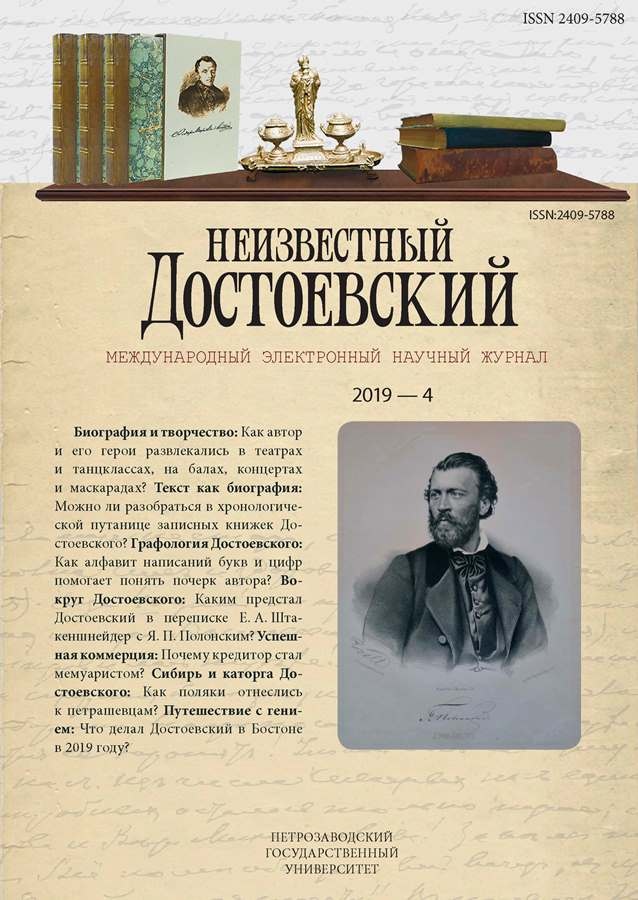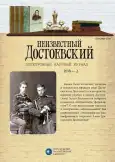Том 5, № 2 (2018)
Статьи
Достоевские из Достоево: «Беларусь и Ф. М. Достоевский» как предмет исследования
Аннотация
В статье рассматривается вопрос о значении при изучении наследия Ф. М. Достоевского истории рода Достоевских на землях Великого княжества Литовского как реального источника религиозно-философских проблем, поставленных в творчестве писателя. Само строение исторических судеб трех восточнославянских народов, складывающихся из мировоззренческих крайностей, создавало вокруг себя полемическое пространство с многовековой предысторией, которое потенциально готово развиваться по катастрофическому сценарию. И в данном аспекте образная многозначность «полифонической» картины мира произведений Ф. М. Достоевского, где вера и разум не разделяются идеологической и политической осью зла, а помещаются в поток непосредственных человеческих переживаний и состояний, может стать необходимым условием, позволяющим избежать односторонности и тенденциозности при осмыслении проблемы бытования Юго-Западной Руси в составе Великого княжества Литовского.
 3-12
3-12


«Гнусно подражать народу не хочу». Об одной двусмысленной фразе из подготовительных материалов к роману Ф. М. Достоевского «Преступление и наказание»
Аннотация
В статье анализируется фраза из подготовительных материалов к роману Ф. М. Достоевского «Преступление и наказание», опубликованная в седьмом томе Полного собрания сочинений в 30 т.: «“Гнусно подражать народу не хочу”» (реплика главного героя произведения Родиона Раскольникова). Для доказательства тезиса, что в таком виде фраза выглядит как идеологически противоречащая всем другим текстам писателя, включая и окончательную версию романа, привлекается ряд трактовок текстовой двусмысленности в лингвистическом и литературоведческом аспектах. Приводятся доказательства того, что черновая запись писателя имеет иную текстологическую природу, чем печатный текст произведения: в ней могут содержаться пропуски знаков пунктуации, букв и слов, что является не ошибкой, а естественной частью избранного автором формата автокоммуникации — быстрой записи в сокращенной мнемонической форме задуманных художественных идей. Делается вывод об ошибочности воспроизведения этой фразы в вышеуказанном издании и необходимости читать ее в одном из двух вариантов:
«Гнусно / подражать народу не хочу» и «Гнусно подражать народу / не хочу» (знаком «/»
отмечено место, где при печатном воспроизведении фразы должна находиться запятая, точка или точка с запятой).
 13-28
13-28


Кузнецкий почтмейстер, которого Достоевский выбранил «формалистом»
Аннотация
Статья посвящена Кузнецкой почтовой конторе и ее руководителю — почтмейстеру П. Ф. Байгашеву (Байгишеву), которого Ф. М. Достоевский в письме к А. Е. Врангелю от 23 августа 1855 г. назвал «формалистом». Автор выявила неизвестные ранее факты об этом чиновнике, его семье и знакомых, наградах, продвижении по карьерной лестнице. Данная научно-исследовательская работа сочетает в себе биографические данные о конкретном почтовом должностном лице, исторические сведения из жизни Почтового департамента, а также повседневные детали Кузнецкой почтовой конторы и города Кузнецка Томской губернии в целом. Некоторые имена кузнецких почтовиков и архивные документы вводятся в научный оборот впервые. Исследование проведено на основе изучения документальных источников Государственного архива Томской области (метрических книг, отчетов городских начальников, циркуляров, деловых писем, ведомостей, списков и пр.) и сборников статистических сведений середины — конца XIX в., хранящихся в библиотечных фондах Томска и Москвы.
 29-44
29-44


Телеграммы разных лиц к А. Г. Достоевской с соболезнованиями в связи со смертью Ф. М. Достоевского (из рукописного фонда Государственного музея истории российской литературы им. В. И. Даля)
Аннотация
В публикации представлен комплекс телеграмм-соболезнований, отправленных в адрес А. Г. Достоевской в связи со смертью Ф. М. Достоевского. Бланки двенадцати телеграмм, поступивших в адрес вдовы с 27 января по 20 февраля (старого стиля) 1881 г., вклеены в тетрадь, которая хранится в составе рукописного фонда Государственного музея истории российской литературы им. В. И. Даля (Государственного литературного музея). Похороны Достоевского стали значимым общественным событием. Телеграммы передают духовное и эмоциональное состояние, которое переживала русская общественность в связи с уходом из жизни писателя. Их география обширна: Москва, Тверь, Кронштадт, Казань, Саратов, Харьков, Одесса, Старая Русса, Рим, Белград. Среди отправителей были лица разного возраста и социального положения: великие князья Сергей и Павел Александровичи, прославленный генерал М. Г. Черняев, харьковский педагог Х. Д. Алчевская, учащаяся молодежь, преподаватели, представители литературной общественности и провинциальной интеллигенции (Одесское славянское общество, Казанское общество земледельческих колоний и ремесленных приютов, Старорусское городское общество и др.). Во многих телеграммах подчеркивается соучастие их отправителей в молебнах, панихидах и других памятных мероприятиях по успении Достоевского. В комментариях дается краткая характеристика отправителей и лиц, упоминаемых в текстах.
 45-68
45-68


«Я связана с ней против ее желания»: О расшифровке Ц М. Пошеманской стенографического дневника А. Г. Достоевской
Аннотация
В 2018 г. постановлением Министерства труда и социальной защиты была ликвидирована и ушла в историю профессия стенографиста в связи с ее невостребованностью. Исследователи творчества Достоевского хранят память о двух стенографистках — литературной сотруднице писателя А. Г. Достоевской и Ц. М. Пошеманской, скромной ленинградской стенографистке, сумевшей найти ключ к системе скорописи первой. В 1950–1970-е гг. Ц. М. Пошеманская открыла для общественности дневник А. Г. Достоевской за 1867 г., наброски к «Дневнику Писателя» и «Братьям Карамазовым», биографию Достоевского и некоторые другие страницы, застенографированные рукой помощницы писателя. Сведения, сохранившиеся к нашему времени о Ц. М. Пошеманской и ее масштабной многолетней работе во имя памяти Достоевского, скупы. В данной статье кратко описаны основные этапы профессионального пути ленинградской стенографистки. Некоторые дополнительные факты о жизни и трудах Ц. М. Пошеманской можно почерпнуть из документов, хранящихся в фонде историка-архивиста С. В. Житомирской (ф. 10239) из ГА РФ, — в первую очередь, из писем стенографистки к сотрудникам рукописного отдела Государственной библиотеки им. В. И. Ленина В. М. Федоровой и С. В. Житомирской. Публикуемые в данной статье письма Ц. М. Пошеманской к В. М. Федоровой, размещенные в Приложении, дают достаточно полное представление о методике работы ленинградской стенографистки и ставят задачу использования ее опыта при расшифровке стенограмм не только архива Достоевских, но и других исторических стенограмм.
 69-89
69-89












